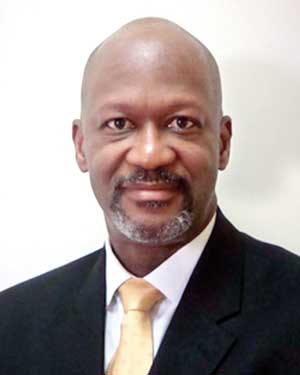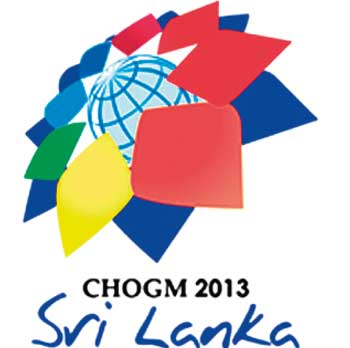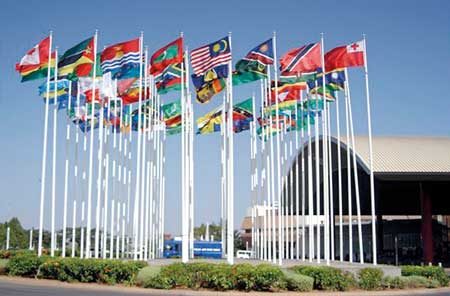_DM-11-2.jpg) Salma Yusuf in candid conversation with Richard Uku, the Commonwealth Secretariat Spokesman and Director, Communication and Public Affairs Division
Salma Yusuf in candid conversation with Richard Uku, the Commonwealth Secretariat Spokesman and Director, Communication and Public Affairs Division
SRI LANKA AS CHAIR-IN-OFFICE
Q: Sri Lanka will take up the mantle of leadership of the Commonwealth for the next two years. What does this mean for the country in practical terms?
Yes, as is customary, the host of each Commonwealth Heads of Government Meeting (CHOGM) automatically takes on the role of Chairperson-in-Office. Commonwealth leaders created this position at the 1999 CHOGM in South Africa. They believed that the Chairperson of each CHOGM should be able to play a representational role, especially in other intergovernmental organisations, during the two-year period between each CHOGM. In 2002 it was agreed that the Chairperson-in-Office could reinforce the Good Offices’ role of the Commonwealth Secretary-General and contribute to strategic advocacy of Commonwealth positions in high-level international forums. This is the role that Sri Lanka will be playing between November and the next Commonwealth Heads of Government Meeting to be

held in Mauritius in 2015.
DUAL SIGINIFICANCE
Q: The word at the Commonwealth is that this year is not only important for Sri Lanka but for the Commonwealth as well. Could you elaborate?
This is indeed a significant year for both the Commonwealth and for Sri Lanka as it prepares to host fellow Commonwealth member countries in November. Hosting the meeting is naturally an important endeavour for any member country faced with the responsibility. At a time when the entire world is facing challenges, be it be with the global economic situation and how it impacts on national economies, with political instability or regional security, the Commonwealth continues to play a crucial role, creating partnerships and promoting dialogue. CHOGM 2013 will provide the highest level forum in the Commonwealth community for such dialogue to take place. For the Commonwealth, this is also the historic year of it coming into effect of its Charter.
RELEVANCE
Q: CHOGM 2011 held in Perth was a turning point in the history of the Commonwealth in that it crystallised the rising tide of questions on the continued relevance of the Commonwealth in the current globalising and international system of the 21st century. What was the backdrop of such a development and how has it impacted on the Commonwealth Secretariat, the Commonwealth member states and its people?
Indeed, Perth was a turning point for the Commonwealth. It was a pivotal time at which Commonwealth Heads of Government agreed on a large number of recommendations made by a ten-member Commonwealth Eminent Persons Group (EPG). The leaders had established the group at their summit in Port of Spain in 2009, tasking it with advising the Commonwealth on building a stronger, more resilient and progressive association. The EPG presented its 106 recommendations to Heads of Government in Perth in 2011. Their objective was to ensure that the association remains relevant to the needs of its members in these current times. The Commonwealth Secretariat has been working to operationalise the agreed recommendations and bring their outcomes to fruition. It has incorporated many of these reforms into its work programmes and its new Strategic Plan for the period 2013 -17.
_DM-11-3.jpg)
COMMONWEALTH CHARTER
Q: Given that the Commonwealth Charter was promulgated in December 2012, how would you respond to the criticism that the Commonwealth, unlike other multilateral inter-governmental agencies, is in its earliest, if not initial stages of normative development?
Shouldn’t such a document have been the bedrock for the existence of a body of nations similar to the UN Charter that was drafted at the time the League of Nations was formed?
The absence of a Charter until recently did not take anything away from the Commonwealth in terms of what we do and how we have operated. The Commonwealth is a voluntary association of independent and equal sovereign states that has worked very effectively by consensus and through consultation, even without a founding charter at the time of its inception. We have always believed in core values and principles, which are now enshrined in one document – the Commonwealth Charter -- which came into effect on 1 January this year and was ceremonially signed by the Head of the Commonwealth earlier this year.
COMMON OR DIFFERENT
Q: Given that there exists between the Commonwealth nations more differences than commonalities, can such a system be sustained for both legitimacy and effectiveness in current times and the future?
One of the unique features of the Commonwealth is the fact that it operates based on consultation and consensus. Thus, irrespective of whatever divergent views may arise at any given time, members do, through consultation and dialogue, come to a consensus at the end of the day.
ROUNDTABLE ON RECONCILIATION MAY 2013
Q: Could you share details of the Commonwealth Roundtable on Reconciliation held in May 2013 in London where Sri Lanka was also a participant?
The Roundtable was convened in furtherance of the work of the Commonwealth Commission on Respect and Understanding. Established in 2005 at the request of Commonwealth Heads of Government, the Commission was tasked to “explore initiatives to promote mutual understanding and respect among all faiths and communities in the Commonwealth.” Chaired by Nobel Laureate Dr Amartya Sen, the Commission’s report of 2007, Civil Paths to Peace, outlines value-driven responses to conflict that are rooted in the Commonwealth’s collectively agreed-upon principles including adherence to and improving human rights and realising economic and social justice for all citizens.
Building upon this work, the Roundtable considered concrete examples and lessons learnt by member states in their efforts to realise the very outcomes outlined in “Civil Paths to Peace.” It sought to foster a stronger understanding of the core elements of effective and sustainable reconciliation, which include truth, justice and accountability. The Roundtable featured examples of transitional justice processes that encompass accountability, truth-seeking, reparation and institutional reform. Best practices and lessons learnt on how to realise post-violence reconciliation, recovery and development were considered.
To discuss and evaluate these initiatives, the Roundtable brought together expert practitioners, state representatives, national human rights institutions and civil society organisations from Kenya, Papua New Guinea, Rwanda, Sierra Leone, South Africa, Sri Lanka, Uganda and the United Kingdom (Northern Ireland). It presented a rich mosaic of how member states have sought to realise reconciliation and other post-conflict needs across the Commonwealth.
NORTHERN PROVINCIAL COUNCIL ELECTION MONITORING
Q: Could you confirm that the Commonwealth Secretariat will be involved in monitoring the Northern Provincial Council election scheduled to be held in September 2013 in Sri Lanka and share details of how it came about and a status update on preparations?
A: Yes, the Commonwealth Secretary-General has received an invitation from the Commissioner of Elections of Sri Lanka to observe the Northern Provincial Council elections, now announced for September 21, 2013. Following that invitation, an assessment mission from the Commonwealth Secretariat has just concluded a visit to Sri Lanka. Based on its report, the Secretary-General will put arrangements in place for an appropriate Commonwealth presence for the elections.
MEDIA ACRREDITATION
Q: There exists confusion on the media accreditation process and guidelines for local and international media personnel for CHOGM 2013 in Sri Lanka. Can you clarify what is the procedure and who holds the final say in deciding participation of media personnel at the summit this year?
The media accreditation process is quite clear. The journalist completes a Media Registration form online. The Commonwealth Secretariat in London, in consultation with the CHOGM 2013 Taskforce Secretariat in Colombo, reviews the request and either approves or rejects the application.
Members of the media, whose applications are approved, will be electronically issued a Media Accreditation Certificate. The journalist forwards his/her visa application, along with the Media Accreditation Certificate, to the Sri Lanka Department of Immigration and Emigration, using either the online application process or through regular post.
The Media Accreditation Pass will be issued to the media member at any one of the Accreditation Desks at the Bandaranaike International Airport (BIA) or the Media Centre at the BMICH in Colombo. The media professional will have to present both the Media Accreditation Certificate and a valid ID to obtain the Media Accreditation Pass.
LOCAL AND INTERNATIONAL MEDIA
Q: Why has distinction been made between accreditation for local and international media?
This is standard operating practice in the way media accreditation is done at CHOGMs. It is simply a logistical division of labour. “Domestic media” constitutes media professionals based in Sri Lanka, including news and photo agencies. Journalists in this category are those who permanently reside in Sri Lanka (including foreign correspondents) and do not refer to individuals who have a temporary visa for the purpose of covering CHOGM 2013. “International media” constitutes media representatives travelling from other countries other than Sri Lanka to cover CHOGM 2013. This includes media representatives who have a temporary visa for the purpose of covering CHOGM 2013.
 TALK-SHOP
TALK-SHOP
Q: Certain quarters have voiced reservation that a CHOGM is nothing more than a mere “talk-shop” that involves large amounts of money, how would you respond?
CHOGM is an important forum that brings Commonwealth leaders together every two years. The leaders meet to discuss global and Commonwealth issues, and agree on collective policies and initiatives. These meetings are the principal policy and decision-making forum to guide the strategic direction of the association. They are organised by the host nation in collaboration with the Commonwealth Secretariat.
After a formal opening ceremony and a formal Executive Session, the leaders meet privately in a ‘Retreat’ setting. The atmosphere is informal, encouraging a full and frank exchange of views, and decisions are reached by consensus.
Issues discussed at previous CHOGMs include international peace and security, democracy, climate change, multilateral trade issues, good governance, sustainable development, small states, debt management, education, environment, gender equality, health, human rights, information and communication technology, and youth affairs.
IMPLEMENTATION
Q: Is there a mechanism to translate CHOGM 2013 decisions for implementation that will bring real meaning to the people of the Commonwealth? Please provide examples if any.
Yes, there is a summit communique at the end of each CHOGM, which enumerates all decisions taken. This communique is issued and made available to the public immediately as the summit ends. In addition, as the primary intergovernmental agency of the Commonwealth, the Commonwealth Secretariat serves as the body that carries forward a number of the mandates generated and monitors the implementation of decisions taken at each CHOGM.
Q: What is the intended legacy for the CHOGM 2013 and are there plans and processes in place, or in the pipeline, to institutionalize such legacy?
The theme of CHOGM 2013 is: “Growth with Equity; Inclusive Development.” Thus, what emerges from deliberations at the meeting will very much centre on th
_DM-11-4.jpg)
is theme. I think it is safe to assume that after three days of discourse around this important subject, we can expect equitable growth and inclusive development to be a strong legacy of the 2013 CHOGM.
BENEFIT TO SRI LANKA
Q: What are the specific benefits for member countries participating in CHOGM and specifically for Sri Lanka as host country? What is the Secretariat’s message to the people of Sri Lanka on the upcoming CHOGM 2013?
Commonwealth leaders come together to discuss matters of mutual interest at CHOGM. Those issues are often ones related with national and global concerns, in which they have an important stake - not the least of all, for many, matters like sustainable development, equitable and inclusive growth, and so much more. It behoves every member country to be present at such important talks so they can contribute to the discourse and draw directly from a wealth of knowledge and best practice.
The Commonwealth Secretariat welcomes the warm hospitality of the Sri Lankan people and the Government of Sri Lanka in hosting this meeting, and is confident that the deliberations of leaders in November will produce outcomes that will be beneficial for the association as a whole, as well as for its constituent member states.
[email protected]
_DM-11-2.jpg) Salma Yusuf in candid conversation with Richard Uku, the Commonwealth Secretariat Spokesman and Director, Communication and Public Affairs Division
Salma Yusuf in candid conversation with Richard Uku, the Commonwealth Secretariat Spokesman and Director, Communication and Public Affairs Division held in Mauritius in 2015.
held in Mauritius in 2015._DM-11-3.jpg)

 TALK-SHOP
TALK-SHOP_DM-11-4.jpg) is theme. I think it is safe to assume that after three days of discourse around this important subject, we can expect equitable growth and inclusive development to be a strong legacy of the 2013 CHOGM.
is theme. I think it is safe to assume that after three days of discourse around this important subject, we can expect equitable growth and inclusive development to be a strong legacy of the 2013 CHOGM.